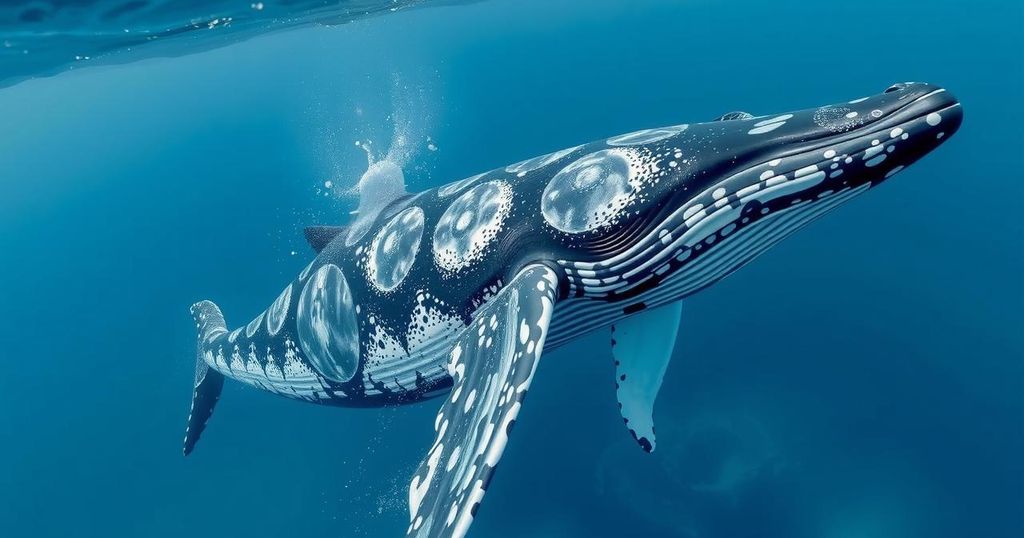Humpback Whale’s Record Migration Highlights Climate Change Concerns

A male humpback whale recently achieved a record-breaking migration of over 8,000 miles across multiple oceans, raising concerns about the impact of climate change on marine life. Sighted first in 2017 off Colombia’s coast, it was located near Zanzibar in 2022. This migration may be driven by environmental changes affecting food sources, particularly krill, suggesting broader ecological implications. Researchers emphasize the need to understand the forces driving these new behaviors in cetaceans amid a warming ocean.
A male humpback whale has achieved an unprecedented migration, covering over 8,000 miles (approximately 13,000 kilometers) across diverse oceanic regions. This remarkable journey, observed by scientists, raises concerns regarding the repercussions of climate change on these marine mammals. The migration commenced in 2017, with the whale initially sighted off Colombia’s Pacific coast. After multiple sightings in the same area, it made a remarkable journey to near Zanzibar in the Indian Ocean by 2022, breaking previous records for this species. Scientists, including Ekaterina Kalashnikova from the Tanzanian Cetacean Program, have highlighted the unusual nature of this migration pattern, suggesting that the whale’s movement is influenced by changes in environmental conditions, particularly the availability of food sources such as krill. The observed disturbances in krill populations, attributed to rising ocean temperatures, may have prompted this long-distance travel as the whale seeks more favorable feeding grounds.
Researchers speculate on various factors motivating this extraordinary migration. These include the search for new feeding habitats due to declining krill availability, shifts in breeding territories stemming from population recovery efforts, and potential changes in migration routes caused by heightened competition among male whales. As humpback whales adapt their migratory patterns following seasonal cycles between breeding grounds and nutrient-rich coastal waters, climate change is evidently altering their traditional behaviors.
In light of climate change, marine ecosystems are undergoing substantial transformation, leading to the loss of productivity in feeding areas and compelling whales to travel greater distances for sustenance. The alterations in migratory patterns of humpback whales serve as a warning indicator of profound ecological impacts resulting from global climatic shifts. Furthermore, other cetacean species are exhibiting similar behavioral adaptations, signaling intensified environmental stressors within their habitats.
Dr. Kalashnikova articulates that “the exact reasons remain unclear, but among the possible factors are global changes in climate, extreme environmental events (which are becoming more frequent), and evolutionary mechanisms specific to the species.” In conclusion, the notable journey of this humpback whale reflects the interconnectedness of climate change and marine biodiversity, illuminating the urgent need for comprehensive understanding and action regarding environmental challenges affecting oceanic wildlife.
Humpback whales are known for their magnificent long-distance migrations, regularly traversing between tropical breeding grounds and richer, colder feeding areas. However, with the impact of climate change, these routes are increasingly disrupted. The phenomenon observed in this particular whale’s record-setting journey highlights the broader implications of environmental changes on marine life, particularly the effects on food availability and migratory behavior. The migration patterns of humpback whales are generally predicated on seasonal changes, food supply, and reproductive needs. As ocean temperatures rise and krill populations falter, whale behavior may shift dramatically, raising critical questions about the resilience of such species amid ongoing climate disruption.
The remarkable journey of the male humpback whale across over 8,000 miles exemplifies the profound impact of climate change on marine species. This event serves not only as a testament to the adaptability of humpback whales but also as a warning sign of the escalating challenges faced by marine ecosystems. As alterations in migration patterns continue to emerge in response to environmental changes, there is an urgent need for further research and conservation efforts to safeguard the future of these majestic creatures and their habitats.
Original Source: dailygalaxy.com






